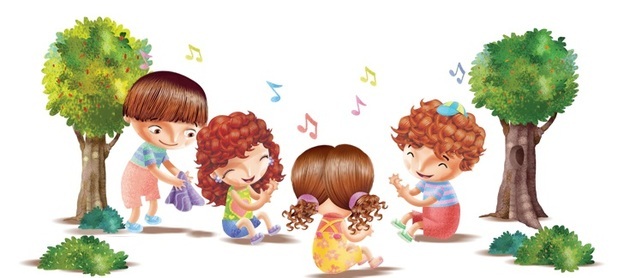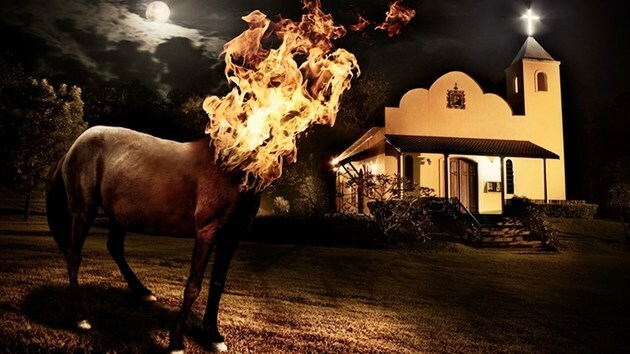At Parlendas are children's rhymes that amuse children, while working with memorization and fixation of some concepts.
According to scholars, parlendas serve as educational systems that are part of popular oral literature and Brazilian folklore.
Children's Popular Parliaments
Get to know some parlendas that we have selected for you.

1. "Running agouti, at the aunt's house.
There are vines running at the grandmother's house.
Handkerchief in hand, fell to the ground.
Beautiful girl, from my heart...
One two Three!"
2. "Little finger,
your neighbor,
Father of all,
Stick cake,
Kills lice."
3. "Potato when it is born
spreads out on the floor.
little girl when she sleeps
put your hand on your heart."
4. "Rain and sun, wedding
of Spanish.
sun and rain, wedding
of widow."
5. "Noon,
pan on fire,
Empty belly.
roasted monkey,
Who comes from Bahia,
Making face,
For Mrs. Sofia."
6. "Uni, duni, have,
Salami, porridge,
A colored ice cream,
You were chosen!"
7. "Who whispers,
the tail sticks out,
Eat bread
With lizard"
8. "I fooled a fool
In the eggshell!"
9. "One, two, beans and rice,
Three, four, beans on the plate,
"Five, six, speak English,
seven, eight, eat biscuits,
Nine, ten, eating pastries."
10. "Today is Sunday, ask for a pipe.
The pipe is made of gold, it hits the bull.
The bull is brave, hits us.
We are weak, fall into the hole.
The hole is deep, the world is over."
11. "Are you cold?
Bathe in the river.
Are you hot?
Bathe in a watering can."
12. "The monkey went to the fair
had nothing to buy.
she bought a chair
to go sit down.
the chair crashed
poor godmother.
It ended up in the hallway."
13. "Pedra rolled,
I winked at the good guy,
Good guy liked it.
I told mom,
Mom didn't even call.
I told daddy,
Slipper sang."
14. "I'm small
The thick leg.
Short dress,
Dad doesn't like it."
15. "King, captain,
soldier, thief.
pretty girl
From my heart."
16. "blonde parrot
from the golden beak
Take this letter
for my boyfriend
if you are sleeping
Knock on the door
if you have woken up
Leave a message.”
17. “Grandma's little house
braided vine;
if the coffee is taking too long
there's definitely no powder."
18. “Up there on the piano
have a glass of poison.
who drank died,
it was his bad luck.”
19. “Where's the bacon that was here?
The cat ate.
Where is the cat?
He went into the woods.
Where is the bush?
The fire burned.
Where is the fire?
The water went out.
Where is the water?
The ox drank.
Where is the ox?
He went to load wheat.
Where is the wheat?
Chicken spread.
Where's the chicken?
He went to lay an egg.
Where's the egg?
The friar ate.
Where is the friar?
It's in the convent.”
20. “The Parrot eats corn.
parakeet takes the fame.
Some sing and cry
Sad fate of those who love."
21. “John cuts the bread,
Maria stirs the angu,
Teresa sets the table,
for Armadillo's party.”
22. "A flea on the scale
jumped up and went to France,
The horses running,
The boys playing,
Let's see who gets it.”
23. "was a witch
At midnight
in a haunted castle
with a knife in hand
Buttering bread."
24. "I climbed the rose bush,
broke a branch
safe (child's name)
otherwise I fall."
25. "Broody hen,
ate worm,
jumped out,
like popcorn."
Characteristics of Parlendas
the parlendas are transmitted orally from generation to generation and therefore do not have a specific author. Because of this, there can also be several versions for a parlenda.
Depending on the composition, his verses are normally of five or six rhythmic syllables to be recited.
The theme of these verses is very varied. They are used in different situations and contexts, that is, there are those that parents declaim to children in order to entertain or calm them down.
In addition, there are the parlendas that are intended to teach or educate children, and in this case, they may contain numbers and ideas.
Another well-known type of conversation is the lock languages. These are texts that use words or sounds very close together and that when said quickly are difficult to pronounce. An example of tongue twisters:
"In a nest of mobsters there are seven mobsters, when the mobster gafas, the seven mobsters puff up."
Curiosity about the talks
Of Latin origin, the word "parlenda" comes from the verb Parlare, which means talk, talk. In Portugal, the parlendas are known as "cantilenas or lengalengas".
Read too: Easy and difficult children's tongue twisters to train children's diction
Folklore Quiz
Don't stop here! See also other manifestations of Brazilian folklore.
- Legends of Brazilian Folklore
- Literature of twine
- What is it, what is it: riddles with answers
- Popular culture
- Wheel songs
- Folk Plays
- Folklore Day
- Source of popular expressions you need to know
- The exciting story of the açaí legend
- Lullabies - Folklore



